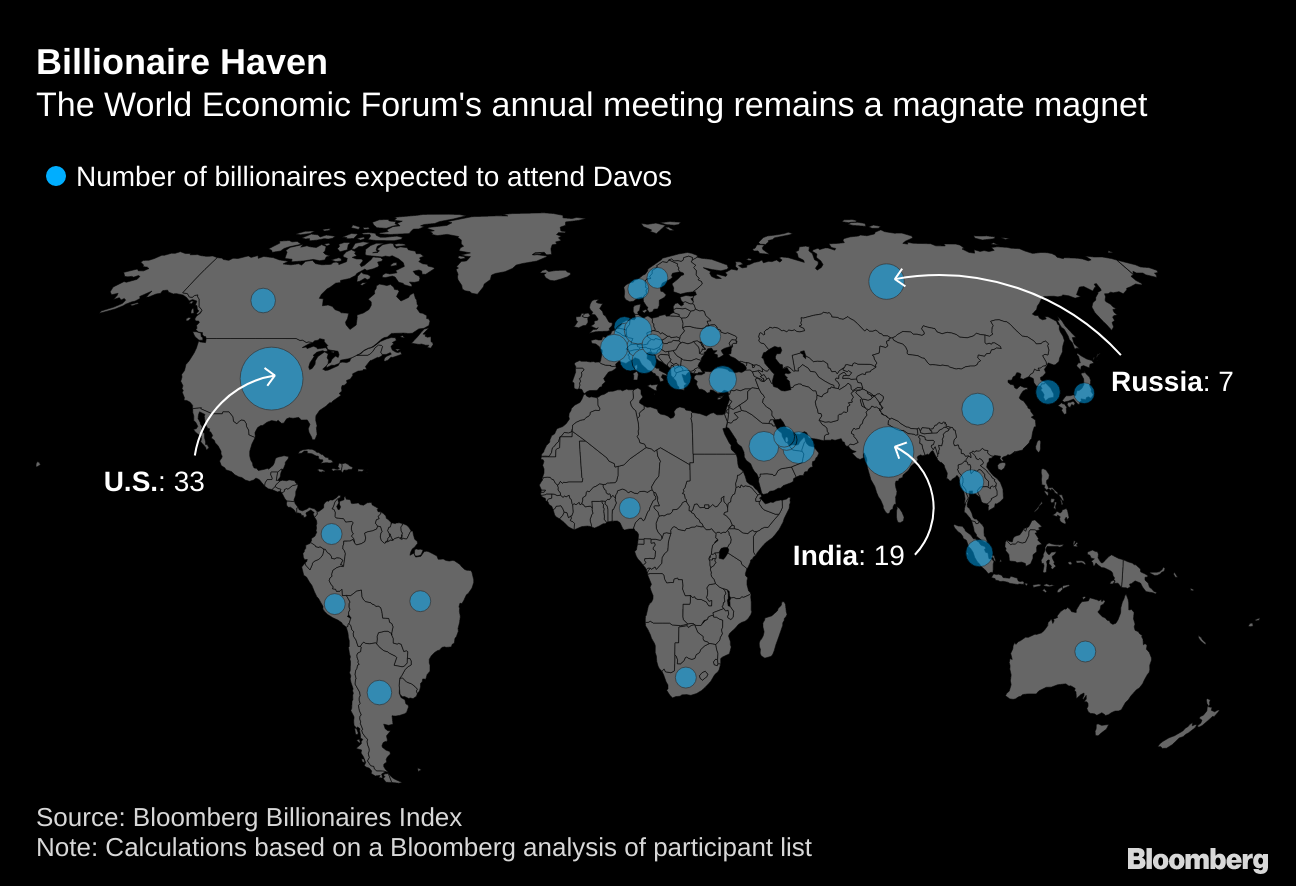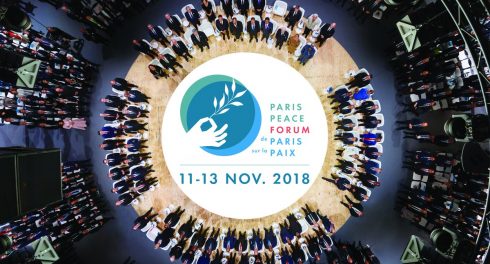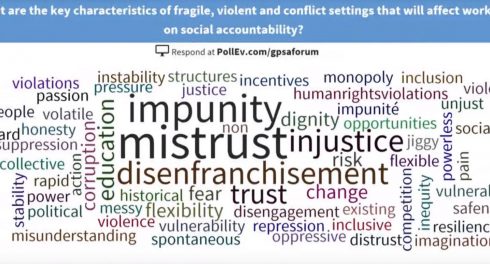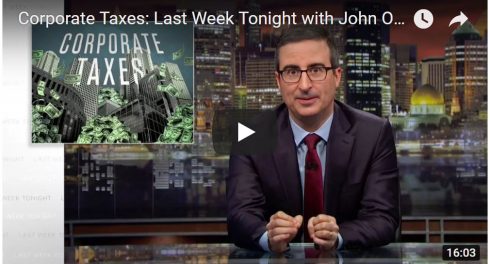Highlights
- It’s a (wo)man’s world
- Money where your mouth is
- Governance gap
- Taxing conversations
- Don’t sell yourself short
- The Accountability Console Webinar
- TAI Spotlight: The reality of racial bias
It’s a (wo)man’s world
 Image credit: Bloomberg
Image credit: Bloomberg
Timed for the gathering of the wealthy and powerful in Davos, a new Oxfam inequality report reveals shocking facts on how the world economy plays out in practice and the extreme inequality that prevails. For instance, Oxfam calculates that the world’s 22 richest men are wealthier than all the women in Africa while the unrecognized and unpaid care work done by women and girls is worth $10.8 trillion annually. What to do? Oxfam recommends governments increase investment in public services and infrastructure and to pass laws that are favorable for women too (e.g. ensure a minimum of 14 weeks of paid maternity leave). More stories on the unequal world we live in a recently published IMF staff Discussion Note which found that an over-sized financial sector increases national inequality.
No cheerier news if one looks at democratic trends. The Economist Intelligence Unit’s Democracy Index registered the worst global democracy score since its inception in 2006 with the decline driven by sharp regressions in Latin America and Sub-Saharan Africa. A similar trajectory manifested in the latest Transparency International Corruption Perceptions Index (CPI) with disappointing results for most countries. Stagnation and backsliding are noted for two-thirds of the 180 countries analyzed, especially in countries where big money flows freely into electoral campaigns. Find out how your country faired on the index as you read and watch Alina Mungiu-Pippidi’s take on the rise and fall of good governance promotion.
Money where your mouth is
Not known for shying away from promoting good governance, George Soros announced a $1 billion commitment to higher education to promote “citizen engagement to advance open societies.” (See more under TAI Spotlight).
Not that Anand Ghiridharadas will necessarily be impressed – hear his interview suggesting its time to get rid of billionaires on the Equals podcast.
Meantime, could the Foreign Corrupt Practices Act be under threat? No published plans but clearly US leadership has it in its sights. Not that problems reside in government or industry alone. Fraud can happen in any sector, including in non-profits, exacerbated by the lack of any unified accounting and reporting standard. But a new initiative plans to change that.
Want some more optimistic takes? Joe Powell details a three year plan for the Open Government Partnership to scale its impact while Karolis Granickas offers his predictions for open contracting in the European Union in 2020. Want more? Check out this special edition of the Journal of eDemocracy and Open Government on “Open Government: Inclusion, Impact, and Participation”, featuring authors who have had their papers accepted to the OGP Academy 2019.
Governance gap
|
Essential Listening: People, Planet and Public Finance Podcast
Listen the new podcast series by the International Budget Partnership and the International Institute for Environment and Development as they explore issues, ideas, and examples of promising work at the intersection of people, the planet and public finance while helping to strengthen domestic climate finance accountability in countries most vulnerable to impacts of climate change.
Taxing conversations While global digital tax rules get debated in Paris this week, at least some steps towards a higher level of tax transparency. As countries seek to recover some of some $600bn tax booty lost yearly to corporate tax avoidance, the Global Reporting Initiative launches its GRI 207 tax standard to get companies to publicly report detailed information about their tax practices – a parallel shift to requirements in the OECD’s Framework on Base Erosion and Profit Shifting (BEPS). Find more practical ways the GRI 207 tax standard can help raise money for SDGs as Sanjeev Gupta and Peter Mullins gives an insight on how sub-Saharan African countries can eliminate tax avoidance in Multi-National Enterprises (MNEs) operating in their territories. In another paper, Peter Mullins provides guidance on strategies that developing countries can adopt to address international tax challenges as Birahim Bouna Niang and Ahmadou Aly Mbaye advise Senegal to revamp its narrow tax base and get more people in the informal sector into the tax system.
While global digital tax rules get debated in Paris this week, at least some steps towards a higher level of tax transparency. As countries seek to recover some of some $600bn tax booty lost yearly to corporate tax avoidance, the Global Reporting Initiative launches its GRI 207 tax standard to get companies to publicly report detailed information about their tax practices – a parallel shift to requirements in the OECD’s Framework on Base Erosion and Profit Shifting (BEPS). Find more practical ways the GRI 207 tax standard can help raise money for SDGs as Sanjeev Gupta and Peter Mullins gives an insight on how sub-Saharan African countries can eliminate tax avoidance in Multi-National Enterprises (MNEs) operating in their territories. In another paper, Peter Mullins provides guidance on strategies that developing countries can adopt to address international tax challenges as Birahim Bouna Niang and Ahmadou Aly Mbaye advise Senegal to revamp its narrow tax base and get more people in the informal sector into the tax system.
Looking at the broader fiscal picture, Hong Zhang also wants you to look beyond the simplistic understanding of China’s “debt-trap diplomacy” narrative to addressing the consequences of state capitalism as a top-down model of development.
Illegal mining in Nigeria may dash the government’s hope of boosting mining’s contribution to GDP to three per cent by 2025 as a Premium Times review of the NEITI’s 2015 and 2016 Solid Minerals Audit reports shows shady practices by registered mining companies costs Nigeria billions of Naira. Nigeria might learn from Tanzania whose extractive industry shows signs of turning around its fortunes in 2019 after embarking on reforms to boost revenue collection.
More lessons in this World Bank manual that help identify good practice options for reducing corruption risks in the natural resources and extractive sectors, with more focus on the early and crucial licensing phase. R4D’s Accountability and Citizen Engagement practice is also developing pilot programs to test approaches for reducing corruption risks in the management of natural resources, especially in the extractives industry (oil, gas and mining). Learn more about the program’s transparency, accountability and participation framework and anti-corruption efforts in Nigeria and Peru from R4D’s Mario Picon.
Meanwhile, the Philippines House Committee on Appropriations approves a fiscal regime bill for the mining industry. The bill calls for large-scale metals miners to pay a royalty equivalent to 3% of their total gross output but exempts small-scale miners from such royalties.
Don’t sell yourself short
Wondering how much is too much to request when negotiating a grant? Ruth Levine and Barbara Chow offer good pointers for grant seekers when determining how much funding to seek and expect from current and prospective funders.
Hopefully, some newer funders will be paying attention. Tech philanthropy is booming, but not all donors think nearly enough about the needs of the organizations it hopes to help. Yelp Foundation Chair, Miriam Warren shares lessons learned as a nonprofit funder and how tech firms can move fast and fix how they fund nonprofits. However, we might want not want to hold our breath as Chris Cardona, Katie Smith Milway, and Kathy Reich explain why it is hard for Foundations to influence how others give.
Liz Brown makes the case for more rigorous costing in impact evaluation research while Lauren Russell highlights why training the next generation of researchers from low and middle income countries is core to the Center for Effective Global Action’s mission.
On a similar note, Laura Schwartz-Henderson critically reviews the various approaches to improving donor support for media development.
Another data-driven effort by Publish What You Fund called the Development Finance Institutions (DFIs) Transparency Initiative was recently announced. If successful, the initiative will better measure the impact of financial contributions to development projects. This would enable DFIs to identify which contributions make the greatest difference.
The Accountability Console Webinar
Do you work on large scale infrastructure or extractive industries? Do you support the rights of communities harmed by internationally financed projects? This webinar offers a chance to learn more about a new tool to hold development finance investors to account and to discuss ways to join up approaches.
Accountability Counsel has developed an interactive database, the Accountability Console, of all community complaints lodged via international financial institutions’ (IFIs) independent accountability mechanisms (IAMs). Take, for example, this case in Mongolia, where a community of nomadic herders lodged a complaint against the IFC-funded Oyu Tolgoi copper and gold mine, which posed existential threats to their livelihoods and traditional way of life. This and the 1,300 other complaints in the Console provide a body of rare community-level feedback about human rights and environmental grievances tied to internationally financed projects.
The Console tracks developments in complaints and reveals patterns across the accountability system, which can be analyzed by sector, region, financial institution, and more. It also contains a policy benchmarking tool with deep levels of information and comparative views about every policy governing every aspect of the complaint process at each IAM.
The Console can be a powerful tool to uncover how accountable and responsive IFIs are, see patterns in harm across development finance, help mobilize citizen action, and hopefully learn lessons to prevent abuses and strengthen accountability in the future. See this Devex write-up of the Console for more information.
Accountability Counsel, in partnership with TAI, will be holding a webinar on February 27th, from 11am-12:15pm EST (8am-9:15am PT / 4pm-5:15pm UK) to go into more depth on the Console, how to navigate it, and to discuss how it can best reinforce other tools and approaches of groups fighting for accountability, both funders and their grantees.
Register today at Eventbrite!
Registrants will receive an access code to explore the full features of the Console prior to the webinar.
We will send out connection details to all that registered ahead of the event on February 26th.
TAI Spotlight: The reality of racial bias
The Reality of Racial Bias| Ford Foundation
Watch Cara Mertes, the Foundation’s Director of JustFilms initiative as she talks about the reality of racial bias across the globe with Phillip Atiba Goff at the ongoing World Economic Forum.
A look at what’s ahead for the Global Development and Population program| Hewlett Foundation
Find out the Foundation’s Global Development and Population program’s next move as they announce plan to refresh two of their five strategies in grantmaking.
MacArthur Fellows from around the web | MacArthur Foundation
Learn more about the MacArthur Fellows from this collection of YouTube videos. The MacArthur Fellowship celebrates the creative potential of individuals through no-strings-attached fellowships.
George Soros speaks in Davos| Open Society Foundations
“Vexing problems face open societies today, but there are points of hope in the future. Education can lead the way forward,” says OSF Founder and Chair, George Soros. Watch Soros’s speech at the World Economic Forum as he speaks on the state of open governance (reflecting some of the content of his recent book).
Calls and job listings
Job postings at International Budget Partnership (M&E positions too) – Ongoing
Job postings at Ford Foundation – Ongoing
BetterTogether Challenge for innovators – Ongoing
Democracy Fund: Sr. Associate, Strategy & Learning – Ongoing
Communications Production Manager at Data & Society Research Institute – January 31, 2020
Call for proposals for Education Out Loud transnational advocacy grants – January 31, 2020
Head of HR Operations for OSF U.S. offices – January 31
Program Officer for 6 months on OSF Economic Justice Program – January 31
Civic Tech Pitch Competition – January 31, 2020
WinterSchool for Thinktankers at Geneva, Switzerland – February 2-8, 2020
Practice Lead – Research at Water Witness – February 6, 2020
$2.5 million support for 32 partner research projects on health, water and sanitation, agriculture, and economic growth in developing countries – February 10, 2020
From Open to Inclusive Government: Global Innovate and Learn grant – February 14, 2020
Call for suggestions on Humanitarian and Development Data Forum agenda – May 2020
Proposal Submission for the 2020 Summer Evaluation Institute – June 7-10, 2020
Amartya Sen Essay Contest 2020: Illicit financial flows – August 31, 2020
Calendar
Feedback+San Juan: Listening Reimagined – February 26-28, 2020
The Impacts of Civic Tech Conference (TICTeC) – March 24 – 25, 2020 (Reykjavik, Iceland)
Register for the 2020 OECD Global Anti-Corruption & Integrity Forum – 25-26 March 2020 (Paris, France)
EGAP Learning Days workshop – March 30-April 3, 2020 (Addis Ababa, Ethiopia)
Frontiers of Social Innovation: People, Power & Resources: The Redistribution Wave – 12-14 May 2020 (Stanford University, California, USA)
Transparency International: 19th International Anti-Corruption Conference – June 2 – 5, 2020 (Seoul, South Korea)
Human Rights Litigation Summer School at Berlin, Germany – June 8-12, 2020
Women and Girls Africa Summit – June 9-12, 2020 (Durban, South Africa)
RightsCon 2020 – June 9-12, 2020 (San Jose, Costa Rica)
Humanitarian and Development Data Forum – November 2-4, 2020 (Chambery, France)
International Open Data Conference –November 18-20, 2020 (Nairobi, Kenya)


